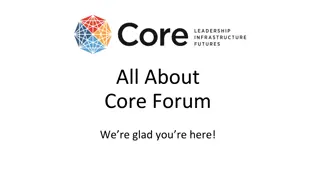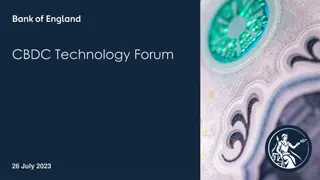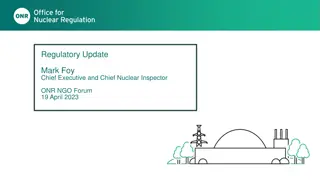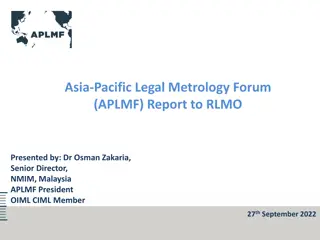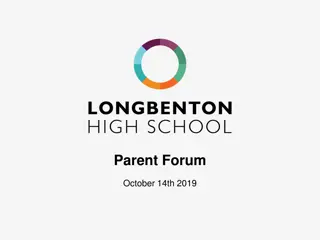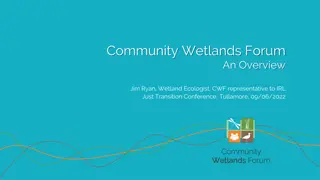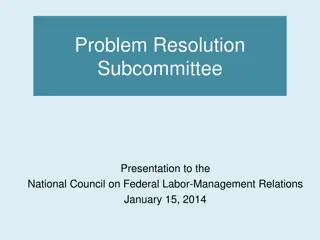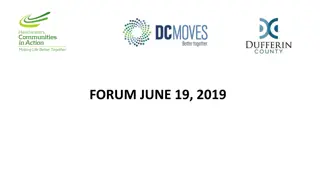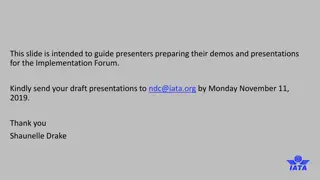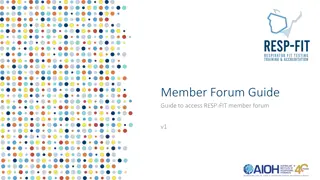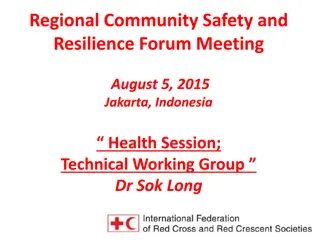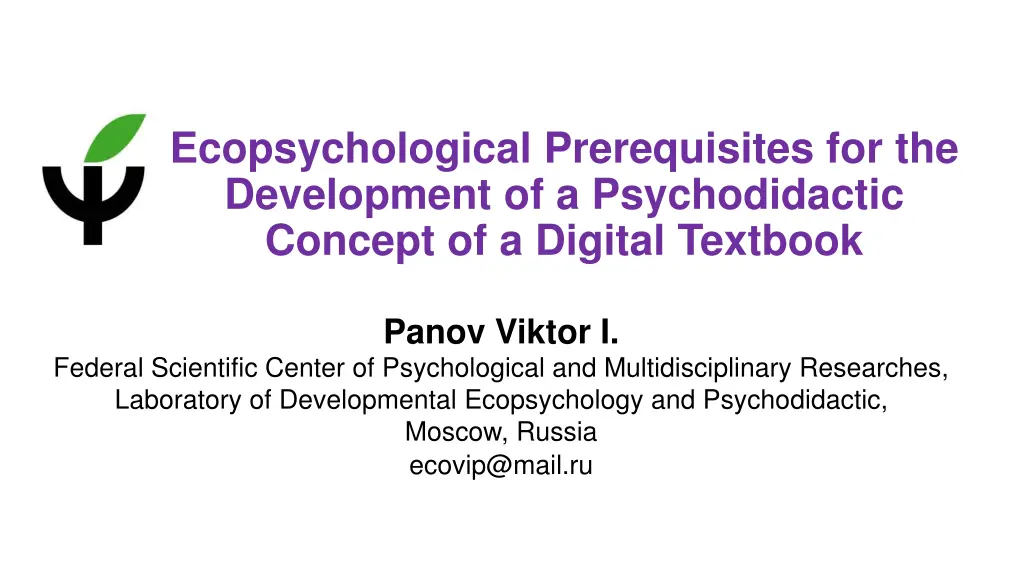
Development of Ecopsychological and Psychodidactic Concept for Digital Textbook
Explore the integration of ecopsychological and psychodidactic principles in the development of a digital textbook, focusing on agent-environment interactions, stages of agency formation, and pedagogical transformation for enhancing student learning experiences.
Download Presentation

Please find below an Image/Link to download the presentation.
The content on the website is provided AS IS for your information and personal use only. It may not be sold, licensed, or shared on other websites without obtaining consent from the author. If you encounter any issues during the download, it is possible that the publisher has removed the file from their server.
You are allowed to download the files provided on this website for personal or commercial use, subject to the condition that they are used lawfully. All files are the property of their respective owners.
The content on the website is provided AS IS for your information and personal use only. It may not be sold, licensed, or shared on other websites without obtaining consent from the author.
E N D
Presentation Transcript
Ecopsychological Prerequisites for the Development of a Psychodidactic Concept of a Digital Textbook Panov Viktor I. Federal Scientific Center of Psychological and Multidisciplinary Researches, Laboratory of Developmental Ecopsychology and Psychodidactic, Moscow, Russia ecovip@mail.ru
Introduction Currently, there are dozens of types of digital learning platforms and dozens of types of digitalization of educational material in the form of digital (electronic) teaching aids and textbooks. In this case, a didactic approach is most often used, when the teaching technology is determined by the subject content of the academic discipline.
Problem Meanwhile, the conceptual development of a digital textbook requires the combined efforts of specialists from different disciplines: didactics, psychodidactics, ecopsychology of the educational environment and, of course, a cybernetic approach to learning. Therefore, in our study, the problem of developing a digital textbook is analyzed from three points of view: Ecopsychological (Panov, 2007; 2014) Psychodidactic (Granik, 2007; Granik, Borisenko, 2021; Panov, 2007) Cybernetic (information and communication, digital) (Kondrat`eva, Rubashkin, 2020)
Ecopsychological prerequisites (Panov, 2007, 2014) Digital textbook as a psevdo-personal agent of learning Group meta-agent "student - teacher - digital textbook" Ecopsychological Typology of Agent-Environment Interactions consists of six types of interactions in the Human - Environment system: Object-Object , Agent-Object , Object-Agent , Agent-isolated , Agent-joint , Agent-generating The ecopsychological model of the formation of agency includes seven stages of development of subjective qualities: motivational, perceptual, reproductive, educational, critical, arbitrary, productive
Psychodidactic prerequisites (Granik, 2007; Granik, Borisenko, 2021; Panov, 2007) Educational material is transformed from an object of learning into a means of developing students abilities. The teacher turns from a translator of educational material into an organizer of joint educational activities with students and educational material. The textbook turns from a passive (objective) source of educational information into an interactive co-participant (co-subject) of educational activities, joint with the student and the teacher. Pedagogical influence (subject-object type of interaction) is replaced by pedagogical interaction and facilitation, which requires subject- collaborative and/or subject-generating types of communicative interaction between the student, teacher and textbook.
Outlines of digital textbook concept A digital textbook must have the properties of interactivity, subjectivity, multimodality, hypertextuality, personality, etc. In other words, a digital textbook should be an active participant (co-agent) of joint learning activities with the student and the teacher. The actions of a teacher in a polysubject group student teacher digital textbook should be based on agent-joint and agent- generating types of interactions. The development of students subjective qualities in interactions with a digital textbook should be built in accordance with the eco- psychological stages of the formation of subjectivity. To implement personalized control, reverse information and digital footprint must be used.
Cybernetic (digital) prerequisites The digital platform must provide information and communication opportunities for: implementation of personalized learning. receiving feedback and digital footprint , interactive management of the educational process, giving it a subjective, productive and interactive character. the emergence of a polysubject group student teacher digital platform as a meta-subject of the educational process, gradual development of the student s agency as a co-agent of joint and subject of independent educational actions. The digital learning platform Teaching to Learn meets these requirements (Kondratieva, Rubashkin, 2022)
Empirical testing of the psychodidactic concept of a digital textbook To test the above premises, a set of interactive tasks was developed on the basis of the digital platform Teaching to Learn , which are designed to develop meta-subject skills and abilities. 184 students from five schools in St. Petersburg and one school in Vologda took part in the experiment.. The results obtained showed that analysis of the digital footprint allows the teacher to evaluate not only the formal completion of tasks, but also the dynamics of the student s subjective qualities. Thanks to this, the teacher gets the opportunity to interactively manage the educational process, giving it a subjective, productive and interactive character.
Conclusions The research carried out is of a pilot nature. Nevertheless, it shows the need and promise of collaboration between teachers, psychologists and cyberneticists to develop a new type of interactive digital textbook. Thank you for attention! The source of information: Panov V.I. , Rubashkin D.D. , Kondratieva I.N. , Borisenko N.A. Psychodidactic, ecopsychological and cybernetic prerequisites for the concept of a digital textbook and the testing of its fragments on the basis of the educational platform "Teach to learn" . Bulletin of the Russian Foundation for Basic Research. Humanities and social sciences. 2023. No. 3 (114). P. 100-115. (In Russ.).


